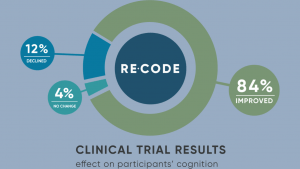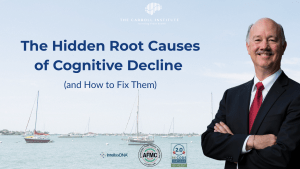Hormonal Causes of Memory Loss: Beyond Menopause
Most people think hormone-related memory problems only affect women during menopause. The reality is far more complex: hormone imbalances cause cognitive decline in both men and women at any age. At The Carroll Institute, we’ve discovered that hormonal dysfunction is one of the most common yet overlooked root causes of memory loss in our Sarasota patients.
As the only ReCODE certified functional neurology clinic in the area, we use comprehensive hormone testing to identify the specific imbalances destroying brain function. The results often shock patients who were told their hormones were “normal.”
The Brain-Hormone Connection
Your brain is the most hormone-sensitive organ in your body.
Hormone Receptors Throughout the Brain:
Every major brain region contains receptors for thyroid hormones, sex hormones, insulin, and cortisol. These hormones directly control brain cell function, energy production, and neurotransmitter synthesis.
Memory Center Vulnerability:
The hippocampus – your brain’s primary memory center – has the highest concentration of hormone receptors. This makes memory formation extremely vulnerable to hormonal imbalances.
Neurotransmitter Production:
Hormones control the production of brain chemicals essential for memory, focus, and mood. Hormone deficiencies directly cause neurotransmitter imbalances that affect cognitive function.
Brain Protection and Repair:
Many hormones provide neuroprotection, preventing brain cell damage and promoting repair. Hormone deficiencies leave the brain vulnerable to toxins, inflammation, and aging.
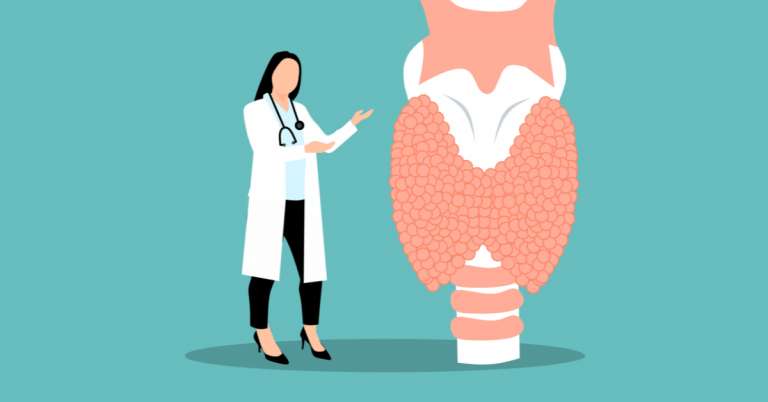
Thyroid: The Master Metabolic Hormone
Thyroid dysfunction is epidemic and severely impacts brain function.
Thyroid Hormone Functions in the Brain:
- Controls brain cell energy production
- Regulates neurotransmitter synthesis
- Maintains brain cell membrane integrity
- Supports neural development and repair
Hypothyroidism and Memory Loss:
Low thyroid function causes brain fog, memory problems, depression, and cognitive slowing. Many patients diagnosed with “early dementia” actually have undiagnosed thyroid dysfunction.
Why Standard Thyroid Tests Miss Problems:
Most doctors only test TSH (Thyroid Stimulating Hormone). This misses thyroid hormone conversion problems, tissue resistance, and autoimmune thyroid disease. Comprehensive testing includes:
- Free T4 and Free T3 levels
- Reverse T3 (inactive thyroid hormone)
- Thyroid antibodies (TPO, TgAb)
- Thyroid binding proteins
Thyroid Medication Limitations:
Standard thyroid medications (Synthroid, Levoxyl) contain only T4. Many patients cannot convert T4 to active T3 hormone. These patients need T3-containing medications or natural thyroid hormones.
Sex Hormones: Not Just About Reproduction
Estrogen, progesterone, and testosterone are crucial brain hormones.
Estrogen and Brain Function:
- Enhances memory formation and recall
- Protects brain cells from damage
- Supports neurotransmitter production
- Maintains brain blood vessel health
Progesterone’s Brain Benefits:
- Calms brain activity and reduces anxiety
- Supports sleep and brain repair
- Protects against brain inflammation
- Balances estrogen’s effects
Testosterone for Brain Health:
- Essential for both men and women
- Supports spatial memory and cognitive processing
- Protects against brain aging
- Maintains motivation and mental energy
Menopause and Male Andropause:
Declining sex hormones cause cognitive symptoms in both genders. Men experience gradual testosterone decline starting around age 30. Women face dramatic hormone drops during menopause
Cortisol: The Stress Hormone That Destroys Memory
Chronic stress and elevated cortisol devastate brain function.
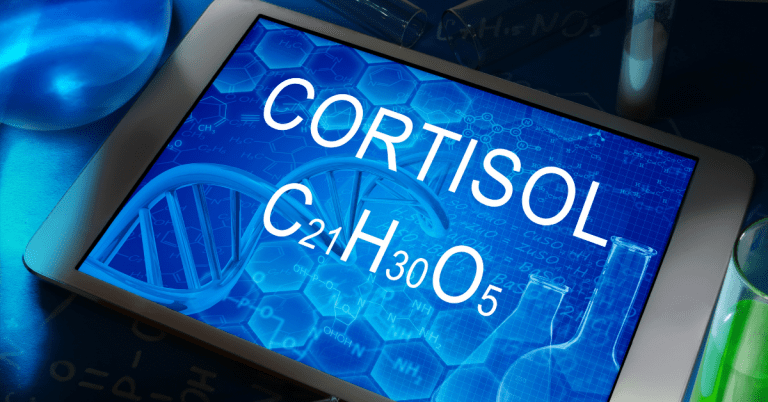
Cortisol’s Brain Damage:
- Shrinks the hippocampus (memory center)
- Kills brain cells directly
- Impairs new memory formation
- Disrupts sleep and brain repair
Chronic Stress Sources:
- Work and financial pressures
- Relationship conflicts
- Health problems and pain
- Environmental toxins and infections
Adrenal Dysfunction:
Chronic stress leads to adrenal fatigue or dysfunction. This causes cortisol imbalances – either too high or too low. Both patterns damage brain function.
The Florida Stress Factor:
Hurricane seasons, tourist traffic, heat stress, and retirement adjustments create unique stressors for Florida residents. These factors contribute to cortisol imbalances and cognitive decline.

Insulin: The Forgotten Brain Hormone
Insulin resistance doesn't just cause diabetes - it destroys brain function.
Brain Insulin Resistance:
The brain develops its own insulin resistance, preventing glucose uptake by brain cells. This “Type 3 Diabetes” directly causes memory loss and cognitive decline.
Insulin’s Brain Functions:
- Regulates brain glucose metabolism
- Supports neurotransmitter production
- Promotes brain cell growth and repair
- Maintains cognitive function
Hidden Insulin Problems:
Many people have insulin resistance with normal blood sugar. Standard diabetes tests miss these problems. Comprehensive testing includes fasting insulin, glucose tolerance with insulin, and inflammatory markers.
Why Standard Hormone Tests Fail
Traditional hormone testing misses most problems.
Timing Issues:
Hormones fluctuate throughout the day and month. Single blood draws miss these variations. Comprehensive testing requires multiple samples or specialized timing.
Reference Range Problems:
“Normal” lab ranges are based on sick populations. Optimal hormone levels for brain function are much higher than standard reference ranges
Free vs. Total Hormones:
Most tests measure total hormones, not the active “free” portions. Binding proteins can make total levels appear normal while free levels are deficient.
Tissue Sensitivity:
Some people have hormone resistance at the tissue level. Blood levels appear normal, but cells cannot use the hormones effectively
The Carroll Institute's Comprehensive Hormone Assessment
We use advanced testing that reveals brain-affecting hormone imbalances.
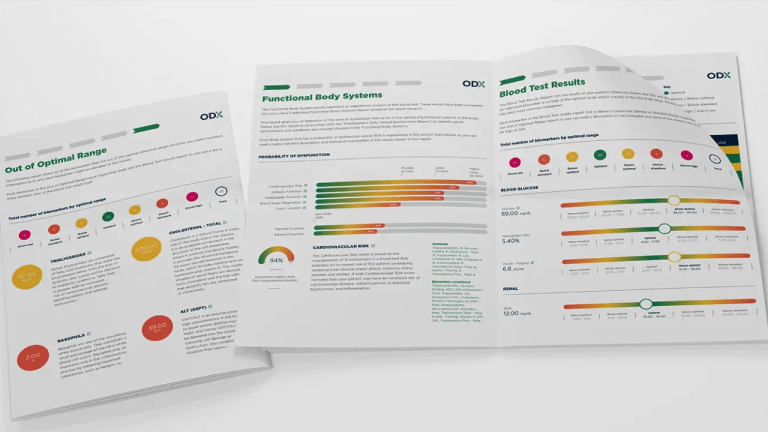
Complete Thyroid Panel:
- TSH, Free T4, Free T3, Reverse T3
- Thyroid antibodies (TPO, TgAb, TRAb)
- Thyroid binding proteins
- Correlation with symptoms and cognitive testing
Sex Hormone Evaluation:
- Estradiol, progesterone, testosterone (free and total)
- DHEA and DHEA-S
- Sex hormone binding globulin
- Metabolite testing for hormone processing
Adrenal Function Assessment:
- 24-hour cortisol patterns
- DHEA production
- Cortisol awakening response
- Stress hormone metabolites
Insulin and Metabolic Hormones:
- Fasting insulin and glucose
- Insulin resistance markers
- Leptin and adiponectin
- Growth hormone and IGF-1
Real Patient Success Stories

Case Study: Susan R., Age 58, Sarasota
Presenting symptoms: Severe brain fog, memory problems, depression, told she had “early menopause dementia”
Testing revealed: Extremely low free T3, high reverse T3, undiagnosed Hashimoto’s thyroiditis
Treatment protocol: T3-containing thyroid medication, autoimmune protocol, custom cognitive exercises
Results: Brain fog completely cleared, memory restored, returned to full-time work

Case Study: Michael T., Age 72, Bradenton
Presenting symptoms: Memory problems, low motivation, difficulty concentrating, diagnosed with “male menopause”
Testing revealed: Very low testosterone, elevated cortisol, insulin resistance
Treatment protocol: Bioidentical hormone replacement, stress management, metabolic optimization
Results: Mental clarity returned, energy improved dramatically, cognitive testing normalize
Bioidentical vs. Synthetic Hormones
The type of hormone replacement matters for brain function.
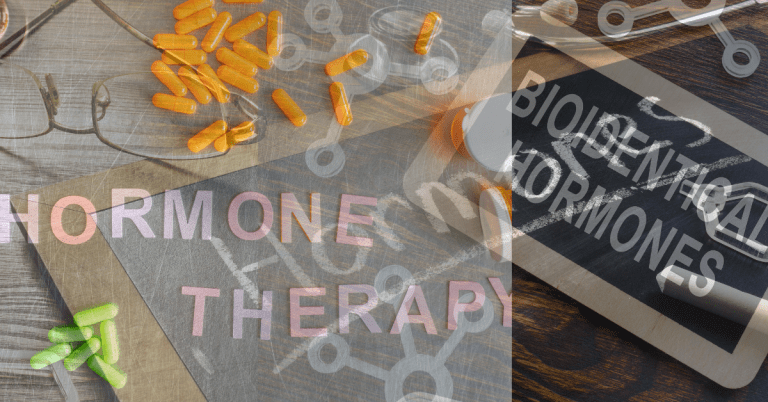
Bioidentical Hormone Advantages:
- Identical molecular structure to human hormones
- Better brain penetration and utilization
- Fewer side effects and complications
- More physiologic effects on brain function
Synthetic Hormone Problems:
- Different molecular structure from human hormones
- May not cross blood-brain barrier effectively
- Higher risk of side effects
- Less optimal brain effects
Delivery Method Importance:
- Topical creams and gels avoid liver metabolism
- Sublingual drops provide steady levels
- Pellet implants give consistent hormone delivery
- Oral hormones may be less effective for brain function
Hormone Optimization Protocol
Effective hormone treatment requires a comprehensive approach.
Phase 1: Comprehensive Testing
Advanced hormone panels that reveal brain-affecting imbalances. Testing includes free hormones, metabolites, and tissue sensitivity markers.
Phase 2: Root Cause Identification
Determine why hormones are imbalanced. Address thyroid autoimmunity, adrenal dysfunction, insulin resistance, and toxin exposure.
Phase 3: Bioidentical Replacement
Use hormones identical to human hormones in physiologic doses. Monitor levels and adjust based on symptoms and cognitive improvement.
Phase 4: Neurological Rehabilitation
Custom cognitive exercises to rebuild brain pathways damaged by hormone deficiencies. The Carroll Institute is the only clinic in Sarasota creating personalized cognitive rehabilitation for hormone-related brain damage.
Age-Specific Hormone Considerations
Hormone needs change throughout life.
Perimenopause (Ages 35-50):
Progesterone declines first, causing anxiety, sleep problems, and brain fog. Early intervention prevents more severe symptoms.
Menopause (Ages 45-55):
Dramatic estrogen decline causes memory problems, hot flashes, and mood changes. Proper hormone replacement prevents cognitive decline.
Andropause (Ages 40-70):
Gradual testosterone decline in men causes memory problems, low motivation, and depression. Testosterone replacement improves cognitive function.
Advanced Age (70+):
Multiple hormone deficiencies accelerate brain aging. Comprehensive hormone optimization can restore cognitive function even in advanced age.
The Hormone-Toxin Connection
Environmental toxins disrupt hormone function.

Endocrine Disruptors:
Chemicals in plastics, pesticides, and personal care products interfere with hormone production and function. These toxins accumulate over time.
Heavy Metals and Hormones:
Mercury, lead, and other metals damage hormone-producing glands. Detoxification often improves hormone function dramatically.
Mold and Hormone Disruption:
Mycotoxins from mold exposure interfere with hormone receptors and production. Mold treatment often restores normal hormone function.
Concerned that hormone imbalances might be affecting your memory and cognitive function? Schedule a free discovery call to learn about our comprehensive hormone assessment and proven optimization protocols.
Your memory problems might have a treatable hormonal cause. Don’t let hormone deficiencies steal your cognitive future.
Dr. Garland Glenn leads the only ReCODE certified functional neurology clinic in the Sarasota area, with extensive experience in hormone optimization and cognitive decline reversal. He has helped hundreds of patients restore their memory by identifying and treating hormone imbalances that traditional doctors miss at The Carroll Institute.

Dr. Garland Glenn, DC, PhD, IFM, AFMC
Founder & Clinical Director, The Carroll Institute — Sarasota, FL
Dr. Garland Glenn is a board-certified chiropractic physician and functional medicine practitioner specializing in cognitive health, neurodegeneration, and root-cause medicine. Certified as an AFMC (Advanced Functional Medicine Clinician) and Institute for Functional Medicine (IFM) trained, he has also completed over 500 hours of advanced training in Functional Neurology under Dr. Ted Carrick, founder of the Carrick Institute.
At The Carroll Institute, Dr. Glenn leads Sarasota’s only ReCODE-certified Functional Neurology program, helping patients reverse or prevent cognitive decline through the Bredesen ReCODE Protocol, neuroplasticity exercises, and personalized functional medicine care.
Learn more about his background and approach at About Dr. Garland Glenn.
– schedule now –
free discovery call
To help you get started, we offer a free 20-minute Discovery Phone Consultation. During this call, you will be able to talk with one of our Certified Brain Health Coaches about what going on with you or your loved one and find out if we can help. Please review our FAQs prior to scheduling your free call. We look forward to talking with you soon and helping you Save Your Brain.
(yes, it’s totally free!)
ReCODE® is a registered program developed by Dr. Dale Bredesen and licensed through Apollo Health. Dr. Garland Glenn is a certified ReCODE practitioner.

